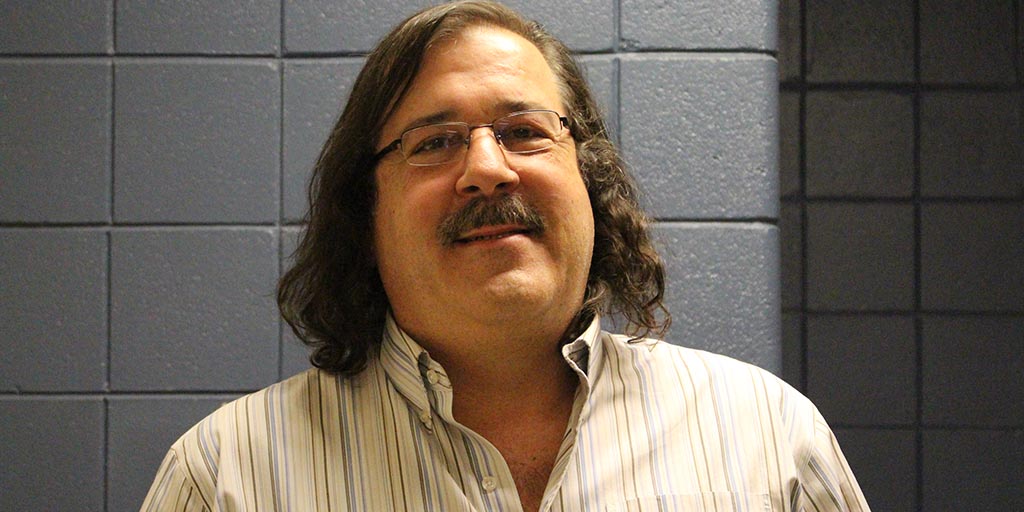Fanshawe professor helping make the college and Earth a better place
 CREDIT: MELISSA NOVACASKA
CREDIT: MELISSA NOVACASKATom Davis, professor in the School of Building Design and Technology is doing his best to make the world a more sustainable place.
Tom Davis a professor in the Donald J. School of Building and Technology can be considered an environmental pioneer with an impressive resume that makes it easy to see just how much he cares for the environment, sustainability and climate change.
Davis, who began his teaching career at Fanshawe in 2008, immigrated to Canada from the U.S. as an adult, has an educational background in civil engineering, majoring in environmental engineering, has worked in the high rise construction business, created his own environmental company (Green-tech Environmental Engineering Ltd.), and is an accredited professional with the Leadership in Energy and Environmental Design (LEED). LEED is managed by the Canadian Green Building Council. Davis was also personally trained by Al Gore the chairman of the Climate Reality Project and therefore is part of the Climate Reality Program Leadership Corps. That entails receiving content prepared by Al Gore and potentially delivering it to students at the college in sustainability. Working with Al Gore has been a highlight in his career so far.
“It’s what I do, all boats rise with the tide. Getting the word out is our last best hope of resurrecting the planet,” Davis said. “Basically everything has to happen this century and by midcentury we have to be off carbon, completely.”
Davis credits his children as motivation to try and help make the world a greener place one step at a time, so future generations can live more sustainably and have the same opportunities as past and present citizens intend to.
“That’s the whole notion behind sustainability. I talk about it a lot, but I practice what I preach,” Davis said.
According to Davis, he’s actively working to help create an earthship community in London, he’s working with the Lawrence School of Business and other college programs to also make Fanshawe more sustainable, and he’s been in contact with the city’s mayor to bring a remanufacturing district to London.
“So there are a lot of different facets of sustainability, part of it is community-oriented, to help build industry and business,” Davis said. “Obviously because I teach in architecture and engineering, the built environment is a big concern to me. If we keep making the same mistakes, we’re going to have serious problems.”
Davis has also accepted the offer to consult with the energy team at Fanshawe, which will help with the roughly 30 projects that are being worked on over campus to reduce energy consumption and save the carbon output and as an economic incentive for the college in terms of London Hydro for example.
Davis said since he’s been at the college, Fanshawe has improved with their interest and effect on sustainability and climate change.
Most recently, Davis has his students on putting a corporate policy for retrofit to net zero design to 68 townhouses across from the college, with hopes of rolling that idea out in the fall to four other programs at the college in the School of Building Technology and School of Design.
This will be a collaborative effort with interior designers, architect students and as Davis said every student needs understand this type of work. “I thought the best way to teach them is to actually do it,” Davis said.
According to Davis, there’s a sort of corporate culture included within the college in terms of looking on expanding sustainability. This allows him to “push the envelope” as much as he can to try and advance change.
Davis walks the environmental walk and talks the environmental talk by not only helping the community, country and world become more sustainable, but he himself also lives with an environmentally- conscious mind, with his personal recreational property being off-the-grid.
According to Davis, his interest in the environment started when he was a child and his father was a park ranger in the summertime. When they were leaving after a camping trip, his father asked Davis to bring back more firewood for the campsite, so that that they could leave the site much better than when they arrived.
“I bought into that mentality very early and my resendetra is really to leave the planet in a little bit better shape than when I arrived here,” Davis said.
With all the work he’s done over the year, Davis is well on his way to achieving this goal.














